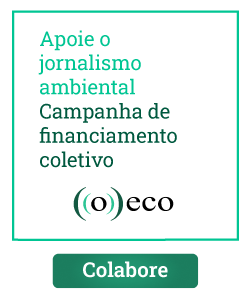Stopping tropical deforestation is part of the struggle against climate change. Developing countries expect rich nations to help pay for it. But will human rights be respected when megabucks are on offer?
credit: FAS/divulgation
You reach the Juma reserve, a 589-hectare piece of land covered with thick rainforest in the Brazilian state of Amazonas, only after a long journey along dusty roads. But even after many bone-shaking hours in a 4X4, you cannot fail to be impressed when you do finally arrive. This is a community in the middle of the jungle which preserves the forest. And perhaps more striking, every single family in the reserve owns a credit card. In fact, there’s a direct link between the inviolate forest and the pieces of plastic. Paying to preserve trees In Juma 339 families live in 35 communities. The state government credits roughly US$50 every month to each cardholder’s account to compensate them for their work in keeping the forest intact. The scheme works very simply. Each family head signs a contract undertaking not to chop or burn the trees. If there is any deforestation, the government will withhold the allowance. It sounds like old Brazilian-style populism, but the scheme, the Programa Bolsa Floresta, is now considered by many specialists around the world a model way to halt tropical deforestation. For years governments and NGOS have been discussing how nations can act together to stop the destruction of the planet’s remaining forests. The debate moved up several notches after forests were recognised as a key factor in the struggle against man-made climate change. The Intergovernmental Panel on Climate Change has now said that deforestation is responsible for 18 per cent of total global emissions of carbon dioxide. Funding from hotel giant The Juma scheme is expected to become the model for a global strategy to protect native forests. This strategy is called REDD – Reducing Emissions from Deforestation and Degradation. Countries which have ratified the UN Framework Convention on Climate Change, meeting in the Polish city of Poznan in December 2008, agreed the broad rules governing how REDD will work. They are now negotiating how to include these rules in the new climate agreement due to be concluded at the UN climate conference in Copenhagen in late 2009.
credit: FAS/divulgation The presidente of Marriot Group and Virgílio Viana handle a credit card to one of the Juma villagers
The project in Juma has been running for only six months and its financial support comes from big private groups interested in offsetting their carbon footprints. The international hotel chain Marriott, for example, besides donating US$2m to the Juma reserve, also argues that reducing carbon emissions justifies it in collecting a dollar a night from its guests to increase funding for the forest dwellers. Using complex future projections, the state government says the money donated to the Juma project by all donors, including large banking companies and food retailers, will by 2050 have prevented the deforestation of 62 per cent of the reserve, saving 210,000 tons of carbon. Carbon offsetting Virgilio Viana is the man who thought up the Juma programme. He is the former Amazonas Environment Secretary and today runs a foundation dedicated to raising funds for other REDD initiatives in the region. He believes Juma’s example shows it is possible to undertake an international carbon offsetting scheme and at the same time to enhance forest people’s quality of life. “We have been pragmatic by involving big corporations in this project and we are accountable in a very transparent way,” he says. But environment and human rights groups are now asking what will be the real impact of a worldwide trade in carbon offsets based on forest resources. Is REDD going to change the life of small communities? And how will local governments share out the benefits? Beyond that, how do you monitor REDD to guarantee that the forest really is protected? Opportunity – or curse? A recent report by a group of UK experts, led by businessman Johan Eliash, says that if REDD becomes a reality it may create an annual flow of US$20-30bn from developed countries to tropical developing countries. The Eliash Report insists this is actually the amount of money needed to stop emissions from deforestation. Patrick Alley, the founder of the environmental campaigning group Global Witness, thinks REDD may be the opportunity conservationists have been awaiting for years. But first, he says, it is crucial to guarantee that once the forest acquires value on the climate market, REDD money is not going to become a curse. “Some of the countries who are negotiating REDD are some of the poorest and most corrupted in the world. Like everything that involves a lot of money, REDD is a big challenge,” Alley points out. Risk of aiding corruption Global Witness has been documenting cases of misuse of forest resources in developing countries for 15 years. Alley remembers cases of ‘sustainable’ forest management that were enthusiastically sold as eco-friendly solutions for communities in central Africa and south-east Asia. In fact, he says, they were examples of policies that can easily aid and abet corruption. “In Cameroon or Cambodia, what we have seen is massive industrial logging being allowed by governments without any benefit for local communities.” Listen to the interview with Patrick Alley from Global Witness The risk of these hidden threats from REDD was the main message which organised indigenous groups tried to get across during the Poznan climate conference. Several developing country groups actually travelled to Poland to ask for the inclusion of specific regulations to protect forest communities and their way of life. “Most of the tropical countries need to improve governance within the forests. There are a lot of illegal activities happening. Although there are good laws and policies, there is no enforcement,” Kenn Mondiai, from Papua New Guinea’s Ecoforest Forum, told me during the conference. Listen to the interview with Kenn Mondiai, from Papua New Guinea’s Ecoforest Forum Rights not on the table But instead of solving their domestic problems first, most tropical countries seem to be rushing to grab the benefits which REDD offers. In January 2009 FERN, an independent trade watchdog based in Brussels, presented a report about 25 REDD national programmes already developed in countries including Paraguay, Ghana, Panama and Cameroon. The report was presented at the Royal Institute of International Affairs in the UK. It reveals that only a few countries have mentioned local communities’ rights in their plans. Land tenure, for example, a critical issue in most tropical countries, was not even seen as a problem. “People’s rights are simply not on the table”, said Iola Leal from FERN.
Land use changes are major sources of emissions (see video showing forest fires caught by the satellite images)
- This story was also published at the Panos Magazine – www. panos.org.uk
Leia também

Brasil aposta na conciliação entre convenções da ONU para enfrentar crises globais
Proposta é de articulação continuada entre acordos ambientais sobre Biodiversidade, Clima e Desertificação. Apenas nove países entregaram suas recomendações →

Ação prende casal que capturou macaco-prego no Parque Nacional da Tijuca
Dupla foi flagrada quando levava o animal, que aparentava estar dopado, em uma mochila. Para autoridades, objetivo seria tráfico em feiras clandestinas e redes sociais →

Maior área contínua de Mata Atlântica pode ser mantida com apoio do turismo
O setor e outras economias que assegurem ambientes naturais e populações locais precisam de mais investimentos e incentivos →






